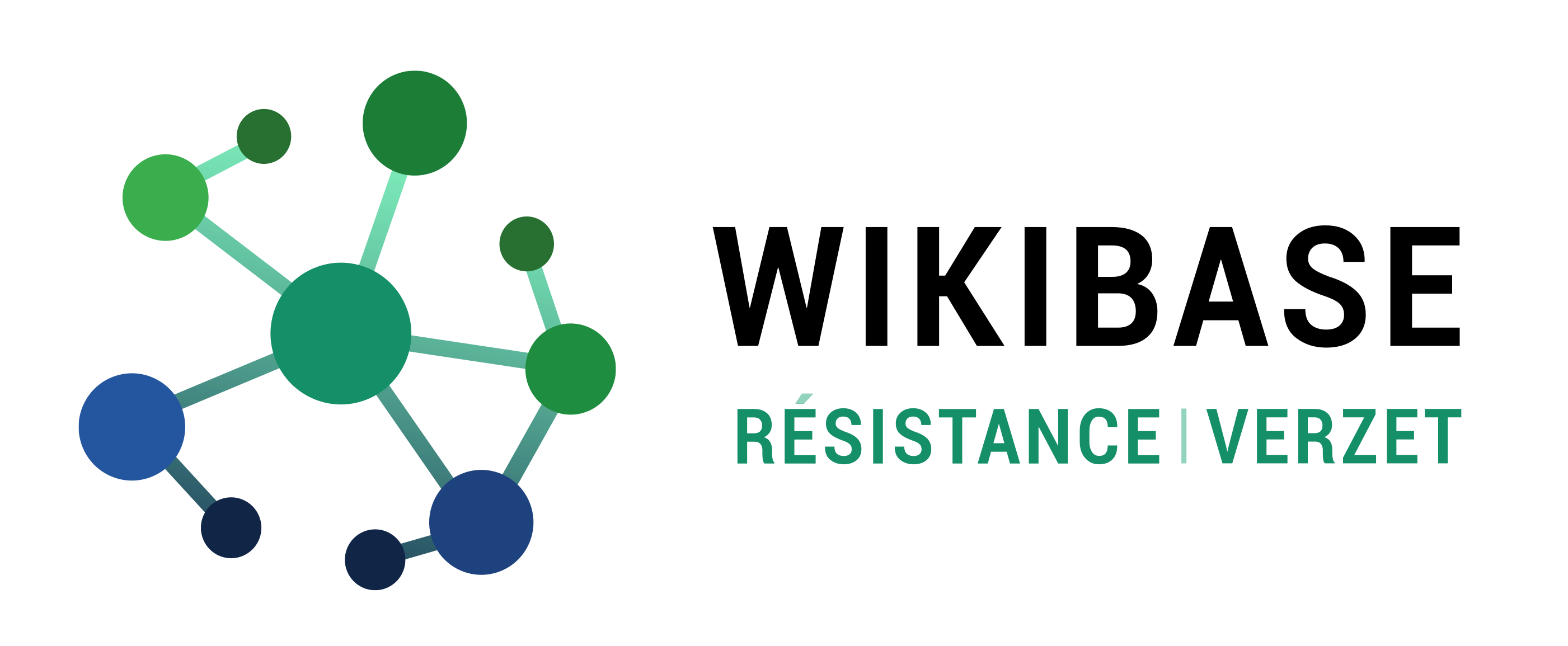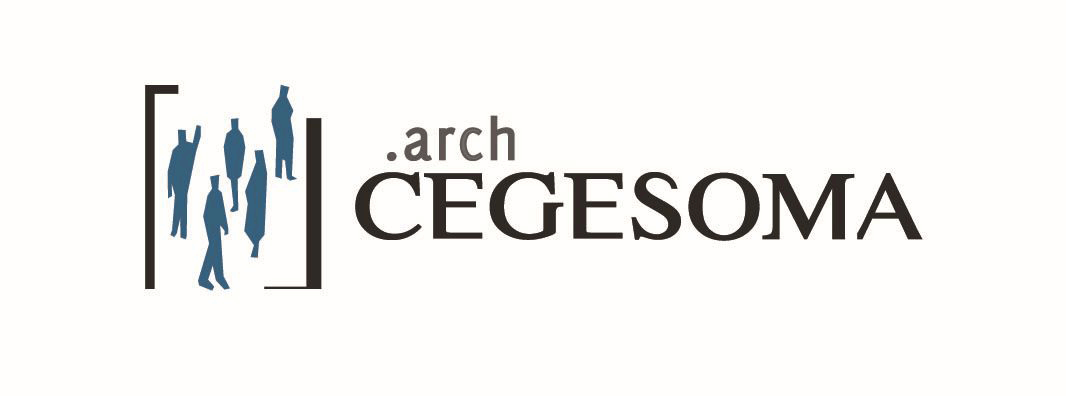About: Difference between revisions
(→Aide) |
|||
| Line 25: | Line 25: | ||
<p>''Wikibase Resistance'' is the fruit of a multidisciplinary team assisted by several volunteers, trainees and student workers as well as personnel of CegeSoma. See the [https://cegesoma.be/en/project/wikibase-resistance dedicated project webpage] for further information.</p> | <p>''Wikibase Resistance'' is the fruit of a multidisciplinary team assisted by several volunteers, trainees and student workers as well as personnel of CegeSoma. See the [https://cegesoma.be/en/project/wikibase-resistance dedicated project webpage] for further information.</p> | ||
<p> | ===<span style="color:#148f67">Help</span> === | ||
<p>Questions about ''Wikibase Resistance''? Do you need assistance for your research? Please consult the [[Frequently_Asked_Questions|FAQ]] for further information. A number of predefined search queries are also at your disposal: <u>Link </u>. </p> | |||
===<span style="color:#148f67">Accès aux données === | ===<span style="color:#148f67">Accès aux données === | ||
Revision as of 14:47, 16 August 2023
A Belgian premiere
Wikibase Resistance is the fruit of a pilot project of the State Archives in Belgium carried out by CegeSoma. This platform enables research about more than 150,000 persons who were involved in one form or another in the different resistance activities led in Belgium during the Second World War. The database contains structured and multilingual data that can be read be humans and machines and allows for simple search queries as well as advanced transversal research in a plenitude of information on the basis of a name, a date of birth, an address or the denomination of a resistance movement or network. It is geared towards the large public as well as seasoned researchers and historians, and intended as a complement to the topical portal site Belgium WWII about the Second World War in Belgium. In the long term, an even more user-friendly research interface shall be developed that enables easier acces and more thorough research in the data.
Thousands of data
The platform houses thousands of data and shall be fed continuously in the course of the coming months through supply and verification of the remaining data. Today, the data contained in the individual files opened by the State Security Service (Sûreté de l’Etat/Staatsveiligheid) about intelligence and intervention agents (46 340) and the files opened by armed resistance movements for the recognition of their members as armed resitants (35 130) are conserved by CegeSoma and have been integrated into the database.
Data from the following records will also be added:
- 25 247 personal files about the Status of resistance fighter of the underground press conserved by the Archives Service for War Victims, and an additional 15 247 preparatory files from Union de la presse clandestine and Front de l’Indépendance.
- 44 076 personal files about the Status of civil resitance fighter conserved by the Archives Service for War Victims, and 5 183 forms filed by the Front de l’Indépendance.
- ~140 000 personal files of the Office de la Résistance about the Status of armed resistance fighter conserved by the National Archives.
A long-term collaboration project
The project was launched in spring 2021 and is coordinated by Anne Chardonnens and Fabrice Maerten (CegeSoma); it is based on the work started in autumn 2019 for the publication Papy était-il un héros ?
Wikibase Resistance is the fruit of a multidisciplinary team assisted by several volunteers, trainees and student workers as well as personnel of CegeSoma. See the dedicated project webpage for further information.
Help
Questions about Wikibase Resistance? Do you need assistance for your research? Please consult the FAQ for further information. A number of predefined search queries are also at your disposal: Link .
Accès aux données
L’infrastructure accueillant les données repose sur la suite logicielle Wikibase. Cette initiative s’inscrit dans une démarche d’ouverture et de réutilisation des données. Ces dernières sont mises à disposition dans un format structuré accessible de trois manières :
- Par le biais de recherches simples, sur la base d’un terme (nom de personne, de mouvement, etc.)
- Par le biais de programmes informatiques grâce à une API (voir exemple et documentation)
- Par le biais de requêtes SPARQL permettant des recherches avancées → renvoi vers point d’accès + documentation et exemples
Conditions d’utilisation
Vous souhaitez réutiliser ou publier du contenu trouvé sur Wikibase Résistance ? Veuillez consulter notre page d'information pour vous vous assurer que vous réutilisez le contenu de façon adéquate.
Contributeur·rice·s
Nous remercions chaleureusement toutes les personnes prenant ou ayant pris part à l’encodage et au traitement des données :
Maximilian Amerstorfer, Sirine Aki, Martin Bagnoud, Eléonore Bastogne, Roland Baumann, Dora Beullens, Zeyneb Buchal, Bernard Burton, Marie-Hélène Calicis, Moritz Clodi, Hedwig Degelaen, Emile Dejehansart, Yves Delvaux, Marc De Win, Jonathan D'Haese, Matthias Domsgen, Julie Douley, Mathilde Fabri, Clémentine Flament, Samuel Frieling, Francesca Giuffredi, Julian Hagenauer, Hilde Keppens, Luc Ketels, Florian Kössler, Monica Lacanale, Zakaria Lamarti, Francis Lambrechts, Adil Lasouad, Fouzia Mahi, Darren Manouvrier, Yvette Martin, Mohamed Taieb Mokkadem, Pierre Mortier, Felix Oberhüber, Noah Plattner, Maximilian Pröll, Hasna Richa, Cecilia Saerens, Ilias Sari, Julika Schulze, Jula Skomski, Alexandre Stroinovsky, Jacques Sweers, Nico Theunissen, Felix Thurner, Kathleen Vandenberghe, Sarah Vanreybrouck.
Publications
Pour consulter des notices générales sur la Résistance en Belgique et des portraits de résistant·e·s, rendez-vous sur : Belgium WWII.
Pour un aperçu global de l'histoire de la Résistance, de sa mémoire, des statuts de reconnaissance nationale et des fonds d'archives contenant des séries de dossiers individuels de résistant·e·s, voir : Fabrice Maerten (dir.), Papy était-il un héros? Sur les traces des hommes et des femmes dans la Résistance pendant la Seconde Guerre mondiale, Tielt, 2020, 352 p. [Ouvrage épuisé]
Pour avoir accès à une bibliographie détaillée sur la Résistance en Belgique, voir : La résistance en Belgique (1940-1944). Bibliographie sélective.
Pour une approche critique des sources relatives à la Résistance, voir : Fabrice Maerten, « Les archives de et sur la Résistance. Par-delà leurs limites, une richesse propice à de nouvelles perspectives », Revue belge d'histoire contemporaine/Belgisch Tijdschrift voor Nieuwste Geschiedenis, 2022, n°1-2, p.226-240, disponible en ligne.
Pour consulter les notices de la plupart des journaux clandestins parus entre 1940 et 1944 en Belgique, voir : José Gotovitch (dir.), Guide de la presse clandestine de Belgique, Bruxelles, Centre de Recherches et d'Études historiques de la Seconde Guerre mondiale, 1991, disponible en ligne. Vous pouvez également consulter une version numérisée de certains de ces journaux sur : The Belgian War Press.
Contact
Si vous avez une question de contenu ou si vous souhaitez participer au projet en tant que stagiaire ou bénévole, prenez contact avec Fabrice Maerten. Si vous avez des questions ou commentaires d’ordre technique, prenez contact avec Anne Chardonnens.





